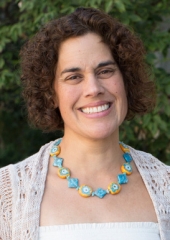The Cornell Chronicle, August 1, 2017.
By Stephen D'Angelo
Cornell researchers are working with Head Start Centers and day schools in New York City on early-intervention work to promote development of spatial skills and language acquisition in preschoolers.

Marianella Casasola, associate professor of human development and a faculty fellow of the Bronfenbrenner Center for Translational Research in Cornell’s College of Human Ecology, said studies show those with better spatial skills are more likely to flourish in STEM fields.
“Working with children at Head Start in Harlem and through a partnership with the Audrey Johnson Day Care Learning Center in Brooklyn allows us to focus on families from a variety of demographics and backgrounds, and to target research on environmental factors within populations of various socioeconomic status,” Casasola said.
Casasola is examining the benefits of constructive play – using blocks, puzzles and shapes – and how language through narration of activities affects cognitive development and spatial skills. She hopes her research findings will inform early-education programs and lead to creation of ideal environments to develop children’s cognitive skills, no matter their demographic background.
“Our goal is to not only understand how early spatial and language skills develop, but also how best to promote their development both at home and in the classroom,” she said. “Designed for preschoolers from low-income families, these programs would be constructed to establish environments for the early development of these skills and promote parent interaction within day-to-day activities, such as counting, simple math and reading.”
Casasola and her team of students are collaborating with the Clinical and Translational Science Center at Weill Cornell Medicine to discover effective approaches to translate such findings for families. She and her students design and host monthly parent training workshops at Brooklyn’s Audrey Johnson day school.
“Children who both interacted and were narrated to saw at least a 30 percent increase in spatial gains over the group that still interacted with the same sorts of activities and games, but did not have language incorporated into their play by an adult,” she said. “Both groups improved, but those who heard items being labeled and actions described showed significantly greater gains.”
The hope is to integrate such development practices into the busyness of day-to-day life and positively impact a child’s language and learning development.
“Many people are surprised to hear that talking to infants really matters,” Casasola said. “The simple message is, remember to talk to your child. And have fun even for only a few minutes of play.”


